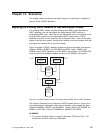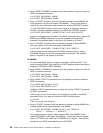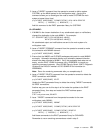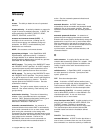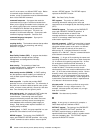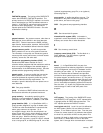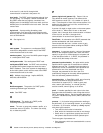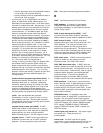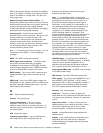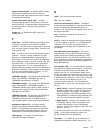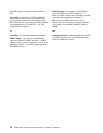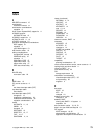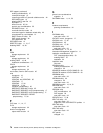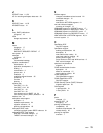is the local LU, and the LU through which
communication is received is the partner LU.
local node. The RRSF node from whose point of view
you are talking. For example, if MVSA and MVSB are
two RRSF nodes that are logically connected, from
MVSA's point of view MVSA is the local node, and from
MVSB's point of view MVSB is the local node. See also
remote node
.
logical unit. A port providing formatting, state
synchronization, and other high-level services through
which an end user communicates with another end user
over an SNA network.
LU. See
logical unit
.
M
main system. The system on a multisystem RRSF
node that is designated to receive most of the RRSF
communications sent to the node.
member system. Any one of the MVS system images
in a multisystem RRSF node.
multisystem node. See
multisystem RRSF node
multisystem RRSF node. An RRSF node consisting
of multiple MVS system images that share the same
RACF database. One of the systems is designated to
be the main system, and it receives most of the RRSF
communications sent to the node.
MVS. Multiple virtual storage. Implies MVS/370,
MVS/XA, and MVS/ESA.
N
NetView segment. The portion of a RACF profile
containing NetView logon information.
node. See RRSF node.
O
OVM segment. The portion of a RACF profile
containing OVM logon information.
owner. The user or group who creates a profile, or is
named the owner of a profile. The owner can modify,
list, or delete the profile.
P
partner logical unit (partner LU). Partner LUs are
LUs defined to remote systems; LUs defined to the
MVS system are local LUs. It is a matter of a point of
view. From the point of view of the remote system, LUs
defined to that system are local LUs, and the ones on
MVS are the partner LUs.
A partner LU might or might not be on the same system
as the local LU. When both LUs are on the same
system, the LU through which communication is initiated
is the local LU, and the LU through which
communication is received is the partner LU.
PassTicket. An alternative to the RACF password that
permits workstations and client machines to
communicate with the host. It allows a user to gain
access to the host system without sending the RACF
password across the network.
password. In computer security, a string of characters
known to the computer system and a user, who must
specify it to gain full or limited access to a system and
to the data stored within it. In RACF, the password is
used to verify the identity of the user.
password synchronization. An option which can be
specified when a peer user ID association is defined
between two user IDs. If password synchronization is
specified for a user ID association, then whenever the
password for one of the associated user IDs is
changed, the password for the other user ID is
automatically changed to the newly defined password.
See also
automatic password direction
.
permission bits. In OpenEdition MVS, part of security
controls for directories and files stored in the
hierarchical file system (HFS). Used to grant read,
write, search (just directory), or execute (just file)
access to owner, owner's group, or all others.
posit. A number specified for each class in the class
descriptor table that identifies a set of flags that control
RACF processing options. See the keyword description
for posit in
OS/390 Security Server (RACF) Macros and
Interfaces
.
process. (1) A function being performed or waiting to
be performed. (2) An executing function, or one waiting
to execute. (3) A function, created by a fork() request,
with three logical sections:
Text, which is the function's instructions.
Data, which the instructions use but do not change.
Stack, which is a push-down, pop-up save area of
the dynamic data that the function operates upon.
The three types of processes are:
User processes, which are associated with a user at
a workstation
68 OS/390 V1R2.0 Security Server (RACF) Planning: Installation and Migration




